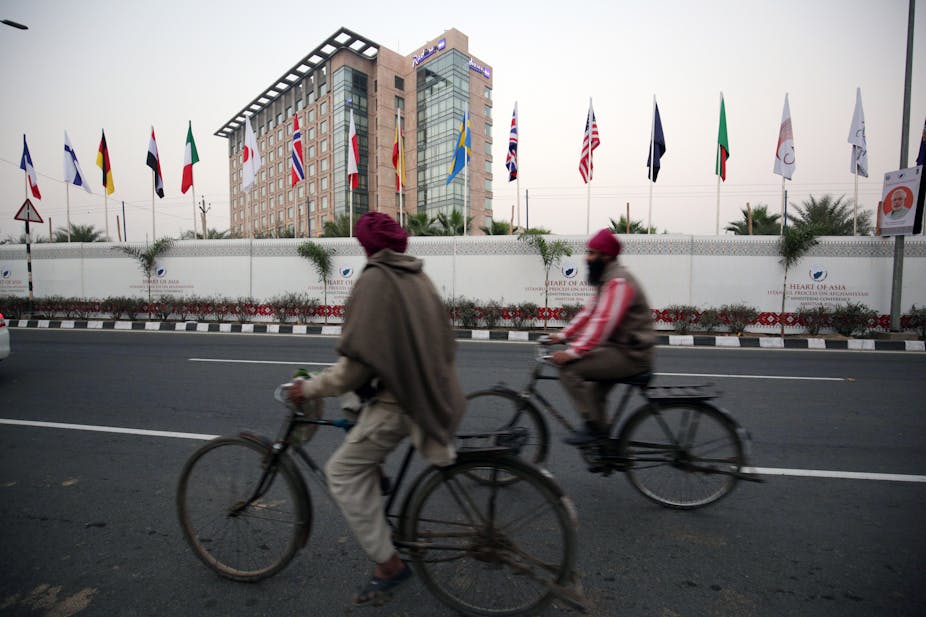At a recent meeting between 14 Asian countries, the topic of security was high on the agenda. A pledge to cooperate towards a peaceful future lies at the heart of the intergovernmental organisation known as the Heart of Asia – Istanbul Process. Whether the group lives up to this pledge is another matter.
Formed in Istanbul in November 2011, the group is part of an international effort to build and secure regional cooperation around Afghanistan. It believes the country’s security and stability is “vital” to the prosperity of the Heart of Asia region, a geographical expanse stretching from Turkey across Central and South Asia to China.
At its sixth and most recent meeting, held in Amritsar, India, in December 2016, the participants referred to terrorism as the single greatest threat to peace. They went on to demand an immediate end to all of its forms.
They also reaffirmed a commitment to “advancing regional cooperation” while stressing the importance of international efforts to combat the enactment, encouragement, and financing of acts of terror.
But the group includes several member countries – Iran, Saudi Arabia, Pakistan – which have been accused of sponsoring international terrorism.
And by far the most significant feature of the meeting was the criticism heaped upon Pakistan by India and Afghanistan. In his speech, Indian prime minister Narendra Modi declared that action against terrorism itself was not enough – but that the world would also need to take steps against “those who support, shelter and finance them”. Modi added:
Silence and inaction against terrorism in Afghanistan and our region will only embolden terrorists and their masters.
This was a deliberate reference to Pakistan, which India has long accused of sponsoring terrorist elements in the ongoing dispute over Kashmir.
Similarly, Afghan president Ashraf Ghani called the toleration by “some states” of terrorist organisations within their borders the “spectre in the room”. He went on to suggest that the US$500m in aid promised by Islamabad would be better spent on eliminating terrorist groups plotting attacks against Afghanistan from within Pakistani borders.

As Afghanistan’s relationship with Pakistan has worsened in recent years, Kabul’s ties with New Delhi have become increasingly strong. This builds on previous attempts by India to isolate Pakistan from the international community. At the BRICS meeting in Goa earlier in the year, Modi slammed Pakistan as the “mothership of terrorism”.
There is mounting evidence that Pakistan is finding itself increasingly isolated from the international community.
This criticism stands in stark contrast to the surprising phone conversation recently reported between American President-elect Donald Trump and Pakistani prime minister Nawaz Sharif.
During this exchange, Trump reportedly gushed that he would love to visit Pakistan, referred to Sharif as a “terrific guy”, and described Pakistan as a “fantastic place of fantastic people”.
This of course followed a series of other unexpected foreign policy statements by Trump. Not yet sworn into the White House, he has already praised the notoriously despotic president of Kazakhstan, suggested the appointment of Nigel Farage as UK ambassador to Washington, and spoken on the phone to Taiwanese President Tsai Ing-wen, a departure from more than 35 years of US-China protocol.
If Trump does indeed pursue more cordial relations with Pakistan, this is bound to infuriate India, particularly given Trump’s campaign promises of forging a closer Indo-US relationship.
During his presidential campaign, Trump courted Indian-American supporters linked to the Hindu nationalist Bharatiya Janata Party (BJP) that swept Modi into power in 2014. Trump went so far as to paraphrase one of Modi’s catchphrases in a commercial in which he awkwardly declared in Hindi: “Ab ki baar, Trump sarkar” (“This time, a Trump government”).
Trump on terror
Part of Trump’s promised appeal to Hindu nationalist supporters was his tough stance on terrorism, exemplified by the proposal of draconian measures that include banning Muslim entry into the US and requiring Muslim-Americans to carry special identity cards. These measures have drawn heavy criticism across the political spectrum but seem to align with Trump’s promise to defeat “radical Islamic terrorism”.
And while Trump’s recent comments about Pakistan may not be enough to derail US-India relations, if he continues to try to play both sides of this tense relationship, the consequences could be dire.
Born out of the partition of British India along religious lines, the two nuclear-armed South Asian nations have fought four wars, as well as a number of border skirmishes and standoffs.
Things have been particularly tense this year following a major escalation of hostilities between the two countries after a terrorist attack that killed 18 Indian soldiers, for which many in India hold Pakistan responsible.

The Amritsar meeting highlighted the potential of regional groups such as Heart of Asia to develop international solutions to global issues. But it also offered a warning of the deepening fault lines that could spell disaster for the very regional security it was designed to protect.

